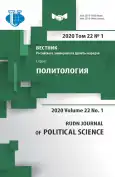Миграционная политика в программах ведущих политических партий ФРГ
- Авторы: Амиантова И.С.1, Иванова Е.А.1
-
Учреждения:
- Российский университет дружбы народов
- Выпуск: Том 22, № 1 (2020)
- Страницы: 81-91
- Раздел: ПОЛИТИЧЕСКИЕ ПРОЦЕССЫ В СОВРЕМЕННОМ МИРЕ
- URL: https://journal-vniispk.ru/2313-1438/article/view/322148
- DOI: https://doi.org/10.22363/2313-1438-2020-22-1-81-91
- ID: 322148
Цитировать
Полный текст
Аннотация
Представленное исследование посвящено отображению концепций миграционной политики в программных документах ведущих политических партий Германии. Целью данной работы является проведение комплексной оценки концепций миграционной политики ведущих партий Германии, закрепленных в их программах. Методология исследования выстраивается за счет комбинации сравнительного дескриптивного анализа и элементов кейс-стади. В роли эмпирической базы работы выступил комплекс материалов программ 6 партий и партийных блоков, представители которых вошли в состав Бундестага по результатам федеральных выборов 2017 г. Автор приходит к выводу, что представители большинства партий, несмотря на отдельные разногласия, придерживаются консенсусной позиции в отношении миграционной политики. Это может означать сохранение текущего курса в обозримом будущем. Существенные изменения в миграционной политике возможны лишь в случае, если руководство ХДС/ХСС сумеет убедить лидеров СДПГ пойти на ужесточение миграционной политики в плане ограничения потока беженцев. Сохранение нынешней модели миграционной политики при аналогичной динамике социальноэкономической конъюнктуры способно обернуться ростом популярности АдГ. Однако это не приведет к дестабилизации политической системы Германии, если АдГ не сможет заключить альянс с другой влиятельной партией.
Ключевые слова
Об авторах
Ирина Сергеевна Амиантова
Российский университет дружбы народов
Автор, ответственный за переписку.
Email: amiantova_is@rudn.ru
кандидат политических наук, доцент кафедры политического анализа и управления
Ул. Миклухо-Маклая, 6, Москва, Россия, 117198Екатерина Александровна Иванова
Российский университет дружбы народов
Email: ivanova-eka@rudn.ru
кандидат политических наук, старший преподаватель кафедры политического анализа и управления
Ул. Миклухо-Маклая, 6, Москва, Россия, 117198Список литературы
- New UN DESA report finds numbers of migrants continue to rise. Monthly Newsletter UN DESA Voice. 2018; 1 (22). Available from: https://www.un.org/development/desa/ undesavoice/highlights/2018/01#37372. Accessed: 15.09.2019.
- Bolshova N.N. Germany’s Immigration Policy towards Highly-Skilled Workers in the 21st Century. Vestnik MGIMO-University. 2012; 6 (27): 226-237 (In Russ.).
- Kositsyn I.A., Maile A.D. Migration in Germany: Looking for Solutions. Vestnik of the Omsk Law Institute. 2010; 2 (13): 26-28 (In Russ.).
- Ljubin V.P. The Revolution of Migration and Its Regulation in Russia, Germany and the EU. Russia and the Contemporary World. 2005;1 (46): 91-107 (In Russ.).
- Mikhailova E.A. Economic Trends and Issues of Migration in Germany. Bulletin of Educational Consortium Central Russian University. Series: Economy and Management. 2015; 6: 54-56 (In Russ.).
- Strelets M.V., Morozova N.N. Germany after Parliamentary Elections of 2013. Contemporary Europe. 2014; 3 (59): 77-89. DOI: http://dx.doi.org/10.15211/soveurope320147789 (In Russ.).
- Valiev D.Sh. Muslim Minorities in Germany: Labour Migration History and State of Public Dialogue Political Science Issues. 2018; 10 (38): 841-847 (In Russ.).
- Vasilyev V.I. Migration as a Bane and Boon for Germany. International Affairs. 2016; 3: 57-70 (In Russ.).
- Radchenko V.V. Germany: Migration Challenges. Nationalism Issues. 2016; 1 (25): 13-20 (In Russ.).
- Derevyanchenko A.A., Derevyanchenko A.A. Germany after Parliamentary Elections 2017: Formation of the Federal Government and Its Perspectives. Citizen. Elections. Authority. 2018; 2: 64-85 (In Russ).
- Kuznetsov A.V. Germany during the Election Year: Angela Merkel’s Pyrrhic Victory? Year of the Planet. Economy. Politics. Security. Moscow. 2017: 227-235 (In Russ.).
- Timoshenkova E.P. Alternative for Germany in the Bundestag: The Turn of Germany to the Right. Scientific and Analytical Herald of the Institute of Europe RAS. 2018; 3: 54-62 (In Russ.).
- Fedina A.V. Testing with Values: The Refugee Problem and Political Prospects of the “Alternative for Germany”. RUDN Journal of Political Science. 2018; 1 (20): 76-88. DOI: http://dx.doi.org/10.22363/2313-1438-2018-20-1-76-88 (In Russ.).
- Morozova S.S. Regional Elections in Germany: Europeanization of Political Parties and Consequences of Migration Crisis in the EU. Political Expertise: POLITEX. 2016; 3 (12): 96-107 (In Russ.).
- Grachev S.I., Kornilova K.A. Basic Ideas of the Political Parties of Germany on Security: Comparative Analysis of Their Programs’ Provisions. Germany at the Crossroads of History. Internal and Foreign Policy Issues in the Context of Foreign Affairs Change. 2018; 9: 28-43 (In Russ.).
- Petelin B.V. Political Conservatism of Christian Democrats of Germany in the Context of the European Changes of the 21st Century. History Studies. Journal of the History Faculty of Lomonosov Moscow State University. 2016; 2 (5): 89-94 (In Russ.).
- Shcherbakov V.Yu. Immigration Policy of the German “Left Party - PDS”: Genesis, Evolution and Prospects. Historical, Philosophical, Political and Law Sciences, Culturology and Study of Art. Issues of Theory and Practice. 2016; 11-1 (73): 205-210 (In Russ.).
- Wir brauchen die Möglichkeiten der Abschiebehaft. The Speech from Thorsten Frei. 16.05.2019. Available from: https://www.cducsu.de/themen/innen-recht-sport-und-ehrenamt/thorsten-frei-wirbrauchen-die-moeglichkeiten-der-abschiebehaft. Accessed: 15.09.2019 (In Germ.).
- Wir handeln zum Wohle Deutschlands. The Speech from Alexander Radwan. 06.06.2019. Available from: https://www.cducsu.de/themen/familie-frauen-arbeit-gesundheit-und-soziales/ alexander-radwan-wir-handeln-zum-wohle-deutschlands. Accessed: 15.09.2019. (In Germ.).
- Venkina E. Germany Saw 100,000 Migrants in 2018. DW news. 10.10.2018. Available from: https://www.dw.com/ru/в-германию-в-2018-году-прибыло-100-тысяч-мигрантов/a-45820287. Accessed: 15.09.2019 (In Russ.).
- The FDP Programme. Available from: https://www.fdp.de/sites/default/files/uploads/ 2017/08/07/20170807-wahlprogramm-wp-2017-v16.pdf. Accessed: 15.09.2019 (In Germ.).
- Hamburg Programme. Principal guidelines of the Social Democratic Party of Germany. Available from: https://www.spd.de/fileadmin/Dokumente/Beschluesse/Grundsatzprogramme/hamburger_ programm_englisch.pdf. Accessed: 07.06.2019.
- Programme of the AfD Party. 2017. Available from: https://cdn.afd.tools/wpcontent/uploads/sites/111/2017/06/2017-06-01_AfD-Bundestagswahlprogramm_Onlinefassung.pdf. Accessed: 30.10.2019 (In Germ.).
- Timoshenkova E.P. Specificity of the Party Political Development of Germany and the Migration Crisis 2015-2016. Transformation of the party and political Landscape in European Union Countries in the period of Crisis. 2017: 337: 20-34. Available from: http://www.instituteofeurope.ru/ images/uploads/doklad/337.pdf. Accessed: 30.10.2019 (In Russ.).
- Programme of the DIE LINKE Party. 2011. Available from: https://en.dielinke.de/fileadmin/download/english_pages/programme_of_the_die_linke_party_erfurt_2011.pdf. Accessed: 15.09.2019.
Дополнительные файлы









